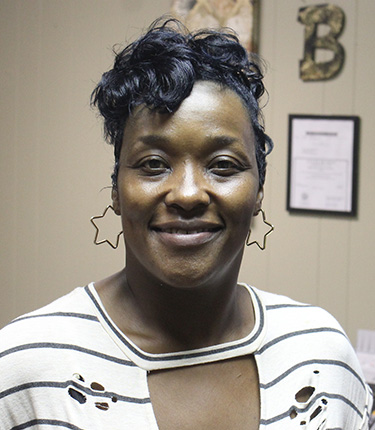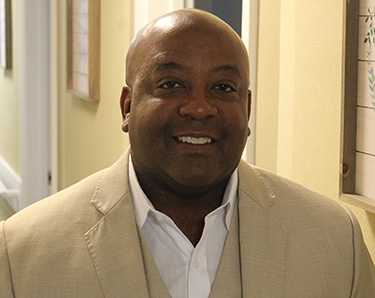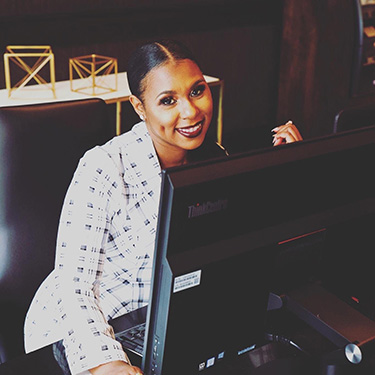By Josh Medore & Precious Battee
YOUNGSTOWN, Ohio – Across the Mahoning Valley, Black entrepreneurs are building businesses that support the communities around them.
And those communities are wide ranging. They may be local artisans, as is the case at Common Goods Studio, or perhaps health-care startups, such as Keyes Business Services, or women looking to build their networks through the Women in Business events launched by Lorri Franklin.
Sometimes the community is the Youngstown area as a whole, like the trio of companies HaSheen Wilson operates, and in some instances, it could be the international clients served by Eartha Hopkins through her agency, The Literary House.
Whatever community they’re working with, the entrepreneurs featured in this edition represent a sliver of Black-owned companies in the area, a vital part of the business community that’s thriving and growing ever-stronger.
Bodo Builds Common Goods to Support Local Businesses
After losing her job early in the COVID-19 pandemic, Sheri Bodo decided to focus on something that made her happy and gave her purpose. The result is Common Goods Studio, a cafe near Mill Creek Park that sells everything from coffee and vegan snacks to locally made clothing, tables and art.
“As someone who’s young and wants to go places to hang out with my friends and support small businesses, I felt Youngstown didn’t really have that all in one place. There are pieces of it in pockets of the community, but not all together. I thought, ‘Why not create it?’” says Bodo.
Her first entry into the business world was in 2018 with The Back Rack, a vintage and upcycled clothing store Bodo ran with her sister. It was that venture that exposed her to the small-business community around Youngstown and inspired her to dedicate a large part of her cafe to local artisans.
“It gave me a chance to get into that space and learn about the small-business community, not only how Youngstown supports us but how we support each other,” she says. “I wanted to make a space for everybody, so everyone can get exposure no matter what they make. I want diverse things; you can buy anything from a pair of socks to a $3,000 table. You can expose yourself to so many customers.”
Before opening her café, Bodo knew that not only did the coffee products have to be up to snuff but that she had to have “complete knowledge of coffee so that I knew I could speak to our product.
“Not only that, I wanted to make sure we have quality over quantity. Everything here is from scratch. Everything is dairy-free and vegan,” she continues. “We show that not only are we capable of making great coffee, but that we’re doing everything with intention.”
Looking around the Mahoning Valley, Bodo says she’s encouraged by the rise of other Black-owned businesses around her. She points to vegan restaurant Cosmic Kitchen in Youngstown and the Carmella Marie beauty products line.
But she knows there’s more to be done.
It’s her hope that the success of Common Goods can serve as an inspiration to the next generation of entrepreneurs.
“It means a lot to not only be a young business owner but also a Black woman business owner as well. It means a lot to see the community support me. But it’s also my duty going forward to make sure that young, Black women understand that there are opportunities out there for us,” she says.
“We have to chase after it. No matter what society tells us or what our past tells us, we have to be the activists of change for our future generations.”
Taltoan Helps Health Startups
All her life, Nakeisha Taltoan has wanted to help people. It’s what led her to get a nursing degree and become a state-tested nursing assistant and, now, to opening Keyes Business Services.

Using her health-care background, Taltoan primarily works with those looking to follow their own path as an independent home-health worker. She works with them from repairing their credit so they can secure the financing needed to start a company all the way through to writing policies and procedures.
“Home health is a growing industry but it has the most complaints. It’s almost always about staffing, when somebody doesn’t treat patients right,” Taltoan says. She notes the importance of having policies about how employees must act on the job.
“Just because someone’s at home, it doesn’t mean you don’t have to provide care. You have to treat them better because this is their home. Some workers are more relaxed because they’re at a home. But you can’t look at it like that,” she says.
Along the way, she’s explaining to her clients exactly what she’s doing, as well as how and why.
“I don’t just want to charge people for what I’m doing. I want them to understand what I’m doing behind the computer,” she says. “They need to know how to do it because if you trust everyone else to run your business, it can go wrong. I’m here to be an assistant, a helping hand.”
Keyes Business Services isn’t limited to those working in health care, Taltoan says. She’s open to working with any small business.
One misstep she frequently sees among startups is their concept of what goes into growing a business. To set them up for success, she works to develop business plans, possible storefront locations and accounting systems.
“If you want to be successful, you can’t just say, ‘I like this building in Boardman. I’ll get a lot of business because it’s there.’ You have to know the area you’re in, what you’re selling and if people will buy it. You have to have marketing skills,” she says.
“We start with discussing what your business is, who you want to target, what’s your budget and then we get into what they need to make it. I tell everybody that they need a secondary job. You’re going to have to put your own money into it,” she says.
Taltoan’s business experience began in 2019 with KMB Lawn Care, a business that she says was thriving until the pandemic hit. When business slowed there, she started focusing all her attention on establishing Keyes Business Services, which celebrated its anniversary in July. She doesn’t view the results of KMB as a failure, but rather as a learning experience.
“I wish we could have gotten a couple more workers because we had a great client base [at KMB]. … It wasn’t a failure. It showed me what I needed to do here,” she says. “It was a hobby project to see what we could do. I was amazed at how far I got it.”
Across 3 Companies, Wilson Builds Bridges
A child-care center, a behavioral health office and an event center may not have all that much in common, but for HaSheen Wilson there’s a uniting force behind his three businesses.
“I call myself a bridge-builder. Even though these businesses are distinct and different, the undercurrent is building a bridge,” says Wilson, owner of Crawling to Destiny Preschool and Learning Center, Youngstown Event Center and New Vision Behavioral Health.
“If you and I can engage, bridge our gaps and parlay that to other people, there’s a richness of people coming together,” he says.

The idea of Crawling to Destiny, for example, came to Wilson after a conversation with one of his sons. Wilson always tried to instill in his kids a sense of inclusion, but still saw them drawing dividing lives between themselves and people in Youngstown.
Crawling to Destiny, he says, has four guiding principles – faith, hope, love, hard work – and makes an effort to be as inclusive as possible, from serving families of all races to having men and women working as educators.
“When you start to understand interacting with people who are different than you, it helps you develop as a person. Oftentimes, we don’t experience those kinds of differences until we go off to college. We want to be inclusive around the staff we recruit and the families we serve,” Wilson says.
With Youngstown Event Center, which opened in late 2019, Wilson has worked to build a space that connects people to the city. The center is housed in a former church at the corner of Market Street and Dewey Avenue. It’s played host to entertainment events and educational programs.
While plenty of similar options exist in the suburbs, Wilson says the decision to make such a place available within the city limits was done with intention.
“I believe that if we give people a reason to participate in things in the city, then their heartstrings will be tied to the city. That’s the driving force behind Youngstown Event Center. We want to provide a space for entertainment, education and empowerment for all people,” he says.
“If you’re a Black-owned business, a lot of times you get branded as only for Black people. Black people participate at White-owned establishments but not so often vice versa. That’s something that has to be addressed. I want people to understand that this is a space for all people.”
Wilson’s most recent endeavor is New Visions Behavioral Health, which opened in May. The impetus behind the office on Midlothian Boulevard was the death of his sister, who suffered mental health issues. The family at one point held power of attorney, but the court returned that power to his sister a few months before she died. At the time, he says, he knew it was a death sentence.
“As a family, it tore our hearts out. If we’d been so involved in her care and the system still treated her this way, what can it do to people who don’t have money or support?” Wilson says. “New Visions is another way to provide for this community and it’s a way to support our healing.”
As a Black-owned behavioral health center, the aim of New Visions is to eliminate some of the barriers that exist in treating Black people, from stigma to misdiagnosis and less effective treatment. When it comes to mental health, having a provider who looks like you and understands where you’re coming from can help in treatment, he says.
“The reality is that there’s an instant alignment when people talk to people who are like them. I’m excited because it’s an anomaly. We don’t see this often. So it’s another layer on top of services: hope,” Wilson says. “The Black community needs to see people breaking through barriers so that they can think, ‘Maybe I can do it too.’”
Hopkins Guides Businesses to Their ‘Why’
As Eartha Hopkins works with small businesses in the Mahoning Valley and around the world, her attention is on helping them build digital communities that enable them to thrive.
“Everyone is grabbing for your customer’s attention, so it is your ‘why’ that’s going to establish your digital community and customer base,” says Hopkins, owner of The Literary House. “But it also builds a relationship with them, which gives longevity, helps with sales, and gets them to understand why your product or service helps their problem.”

After earning a journalism degree, Hopkins landed a job with an advertising agency, where she caught on early to the trend toward digital communications. She then shifted her work from journalism and public relations to content marketing, which in turn led to the creation of The Literary House.
“I started The Literary House as a way to inspire young Black writers and creators to step into their gifts,” she says. “I believe that reading and writing are the foundation of education and self-development. My business hopefully creates visibility and exposure that younger generations can glean from.”
With The Literary House, she provides digital content to clients, helping them promote their business and products. But most importantly, she makes sure clients are explaining their “why.” When people buy products, it’s important for them to understand what makes it different and why it’s important.
“I believe that marketing is about 80% of a business. I tell people, you can have the best product, the best service in the world, but if no one knows you exist, then you don’t have a product,” she says.
Tools such as a blog, social media platform and newsletters are used to engage with customers and build relationships.
Having just taken on her first international client – based in the United Kingdom – Hopkins plans to expand The Literary House. She’s done work for Unilever, Olay, Women’s Health and Allure magazine. But her attention is also here in the Mahoning Valley. She sees plenty of creativity within the Youngstown area when it comes to Black-owned businesses and wants to support the growing community.
“There are a lot of small, Black-owned businesses that reach out to me and have a clear understanding of the value of content marketing, but don’t have the resources for the services. Hopefully my business can change that,” she says.
Franklin’s ‘Women in Business’ Events Build Networks
With years of meeting clients at their homes, Lorri Franklin’s experience as a sales representative for Traci Lynn Jewelry led her to create a platform to give women-owned businesses more exposure for their products.
Through the Women in Business vendor events at the Metroplex in Liberty and other, smaller events across the area, Franklin is building a network for women to promote and expand their businesses.

“It’s important to have a space where people can come together from across the area. We’ve had women and men coming from the Youngstown-Warren area, from Cleveland, some from Pittsburgh,” she says. “It’s important to me to have a venue for everyone to see what others have to offer.”
Even during the pandemic, Franklin put on events for vendors to get more support.
“I was skeptical for the first one last year because it was during the pandemic. Who’d want to go out during that?” she says. “I ended up with 150 vendors at the Metroplex. We had about 10 people cancel, but it was still great and attendance was awesome.”
Beyond just giving women-owned businesses a place to meet customers, the Women in Business events also provide leaders a chance to meet each other and get the word out about their companies.
“It’s a great opportunity for women to come together and network. It may not always be a big sale, but it’s key because you never know who’s going to come through the door,” Franklin says.
Later this summer, she says, two business owners who met at one of the vendor events will co-host a bridal show at the DoubleTree in downtown Youngstown.
“I love seeing that from these ladies. I tell them that you may not make a monetary sale, but when you can get that networking connection, it can take you so many places,” she says.
With a 9-year-old daughter who’s already working on her own business – the So Sassy beauty line – providing a place for women to build their business and dedicate a space for them to thrive is what drives Franklin.
“I bring her to events with me so that she can see what she can do. Right now, she wants to be a
pediatrician and I want to show her what’s out there,” Franklin says. “Women can have their 9 to 5 job and also have a small business that they’re growing.”
Pictured at top: Sheri Bodo says she’s encouraged by the rise of other Black-owned businesses around her.
